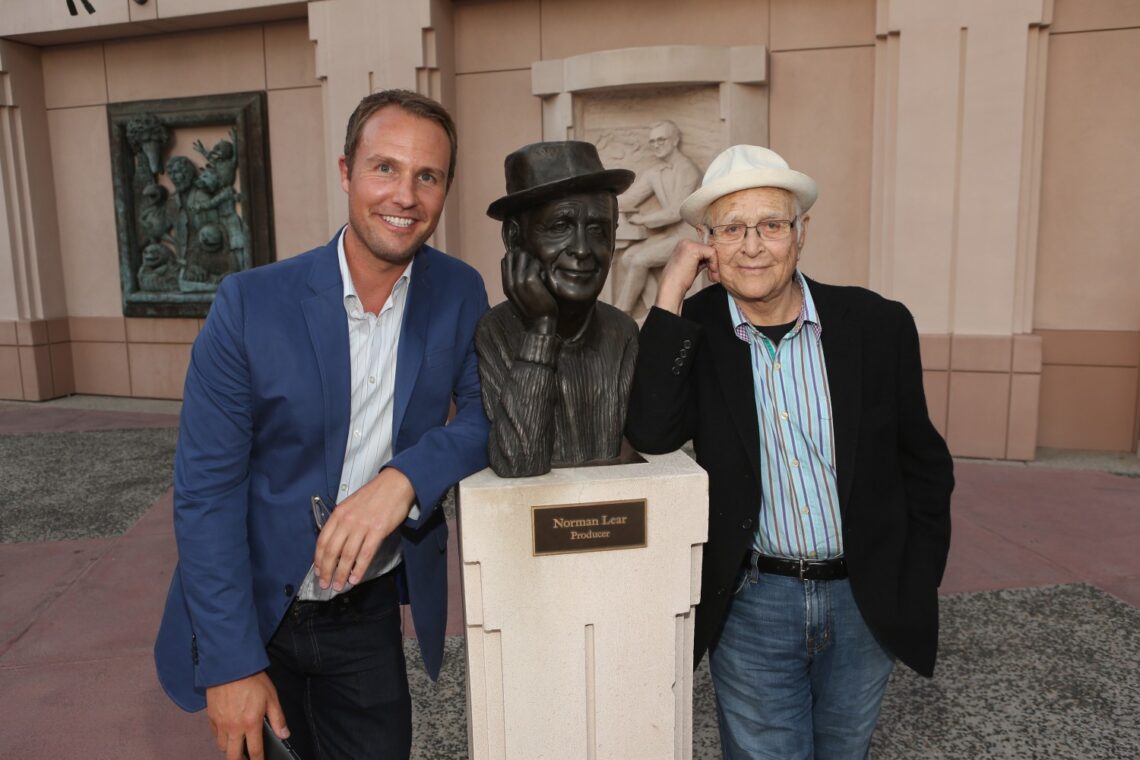Reflecting on a legacy: A personal journey with Norman Lear
A morning in Beverly Hills
It was a typical sunny morning in Beverly Hills when Norman Lear invited me over for brunch on his back patio, overlooking the pool. The spread was classic Lear: hollowed-out bagels, thinly sliced onions, lox, sliced tomatoes, cream cheese, fresh fruit, and his newfound love, freshly squeezed tangerine juice. He savored every bite and sip as if it were a divine experience.
We discussed our current projects, the state of the industry, a bit of politics, and his recent fascination with trees. As we finished our meal, he leaned back, wiped his mouth, and said, “Can I say something that may come across the wrong way? I mean, not the wrong way, because it’s not wrong, but it’s a rare thing to say, let alone share with someone.”
This was typical of Norman. A thought would strike him, and he had to share it. Naturally, I said, “Of course, Norman. Say anything you want.” He paused and then said, “I fucking love, and I mean love – because I’m a man who knows how to love – the way we use each other.” He was 99 years old.
The power of being used
Anyone who knew Norman well, especially those aware of his desire to make the world a better place, would inevitably hear him say, “Please use me. Whatever I can do to help. Use me.” I first heard these words in 2008 during a Fourth of July event on the USS Midway in San Diego. We were producing the event for Declare Yourself, Norman’s nonpartisan youth voter registration organization.
We needed a vocalist to sing the National Anthem and other patriotic songs. “American Idol” was hugely popular then, and I thought it would be great to have one of the “idols” perform. However, the booking agent wouldn’t return my calls. After several attempts, I admitted my struggle to Norman. He immediately picked up the phone, charmed the agent, and secured the performer for our event. When he hung up, he looked at me and said, “Brent, I work for you, just as you work for me. So please use me.” He was 85 years old.
A partnership of mutual benefit
For the next 16 years, we used each other in the most caring, loving way possible. He used me to help market and tour his memoir. I used him to make a documentary on his life and get him back into television. He used me to sustain his “comeback.” I used him to expand our slate and launch my career. It was serendipity at its finest, and those were the best 17 years of my life.
Throughout our time together, there were countless stories that resulted in laughter and tears, reminiscent of the various episodes of television he created. But one act of selfless kindness by Norman changed my life forever.
A letter that lifted a lifetime weight
As human beings, we often seek our parents’ approval and love. I didn’t meet my biological father until I was 17. He had an affair with my mother and chose to stay with his wife and daughters, keeping me a secret. Even during our first encounter, he made it clear that his family could never know about me. My mother honored his request, and he remained absent from my life.
Norman couldn’t understand how my biological father didn’t want to be in my life. He often asked if I would reach out to him again. I explained that I had tried, but his insistence on keeping me a secret made it too difficult. Eventually, I moved on. Norman understood and asked if he could write my father a letter. I agreed, but reminded him that my father’s family didn’t know about me.
A week later, I received an email from Norman’s assistant with a scanned copy of the letter and proof of my father’s signature. The letter read:
June 18, 2015
Dear Albert Horstman,
I begged your son for this address so that I could thank you for the gift of him on Father’s Day. Brent has been working with me for some nine years now and not a day goes by when I don’t have reason to bless his being there.
You have fathered an altogether attractive, smart as hell, determined and loyal, generous and affirmative, proud and dependable man here, newly turned forty. I am in your debt, Sir, for his being on this planet, let alone in my orbit.
Sincerely,
Norman Lear
I never again had to wonder if my father knew I had “made it” in life. The heaviest weight I carried for over 40 years was lifted in four sentences written by Norman Lear. The romantic in me wants to believe that Norman’s constant request to be used found its way into my father’s thoughts and back to Norman. My father, who never met Norman, used him to be the role model, mentor, father figure, partner, and friend he never could be.
Norman Lear, who spent 101 years making a difference, understood the value of being used. He taught me that a win-win is not necessarily transactional but a philosophy of human interaction that benefits us all.

 Italian
Italian







